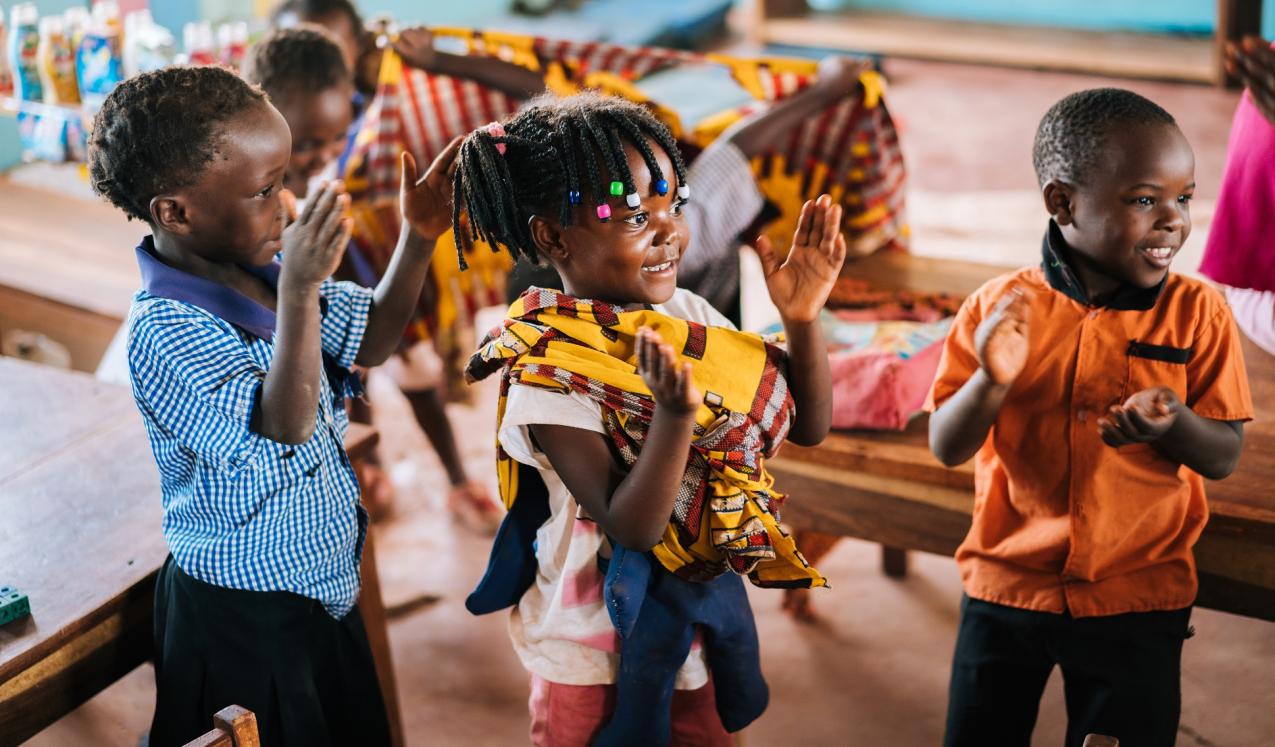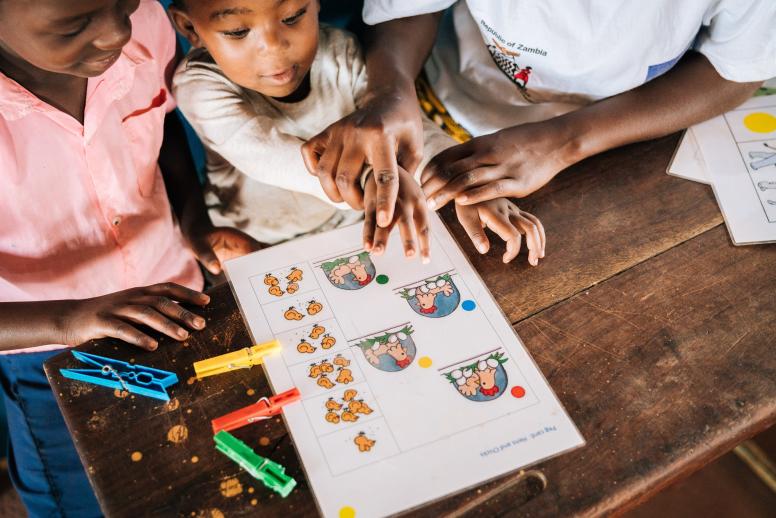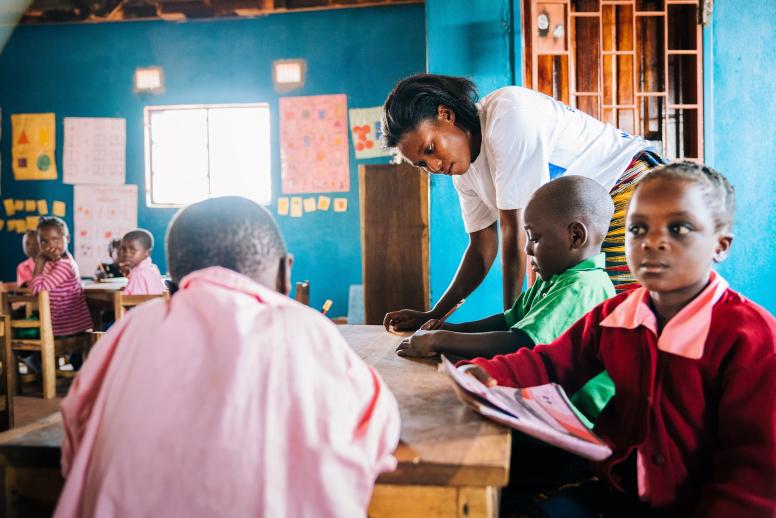
- Blog
- 19 February 2019
Recent years have seen major efforts to challenge gender stereotypes in secondary schools. At VVOB – education for development we also recognise how important it is to support our partner countries such as Rwanda, Suriname and Cambodia to stifle harmful gender stereotyping in the classroom, given its drastic impact on whether girls can make their own choices, explore their talents and interests, and reach their full potential.
But should we also intervene at an earlier stage?
While working at the level of secondary education is definitely effective in empowering many girls and young women, let’s zoom in on a crucial earlier phase. Research shows that the concept of gender takes root in children between the ages of 3 and 7. During this early phase of childhood, they begin to understand gender norms, identities and stereotypes and even acquire strong gender biases around the types of jobs that are suitable for men and women. Check out the interesting research by Levy et al. and by Care et al..
Much of this research is based on data from the global North, and the processes by which gender norms are transmitted can differ from context to context. Yet research among working class children aged 7 to 8 in South Africa also shows that by this age, girls are already negatively affected by gendered interactions and masculine conduct of boys in schools.
With enrolment in preschools rising in every region of the world, there is a growing sense of urgency to work on gender at this early stage, while children are developing gendered norms and identities that will have a tremendous impact on their future lives. The expectations children develop about their own future lives are shaped and their interests are steered in a certain direction, as well as the choices they make in their free time, relationships, education and professional life. In other words: rigid gender norms and identities impose serious limits on the freedom of boys and girls to develop to their full potential according to their unique and valuable talents and interests, regardless of their sex.
Again most available research on the topic has been carried out in the North, highlighting the need for further research in the global South. But it does suggest that early childhood teachers may be instrumental in challenging the development of the gender norms and identities that place such limits on children in (at least) two ways: by tackling their own biases and by challenging gender stereotypes.

Tackling personal biases through self-awareness
Preschool teachers are known to be unconscious validators of harmful gender stereotypes. Girls, for example, are more often praised by teachers for their clothing, appearance and caring behaviours. Boys, on the contrary, are complimented for their physical strength, are given more complex tasks in class and are given more attention and experience more space to express themselves than girls. This seems to be confirmed by research from Kenya where preschool teachers were found to influence children to select and use gender-appropriate play materials, rather than stimulating cross-gender or gender neutral play-materials.
In this way, preschools lay the foundations for a society where men tend to take up more active positions and where less is expected of women. In other words, a society in which life opportunities for boys and girls, men and women are unequal.
One crucial first step, therefore, is to raise the self-awareness of preschool teachers about their own gender biases and they ways in which they translate these into concrete actions in the classroom and interactions with their learners.
Challenging gender stereotypes
Gender stereotypes are not confined to classrooms alone. They are omnipresent and invade young children’s lives through many different channels: role models at home or in their communities, media, advertisements, toys and learning materials, their peers… the list goes on. Once teachers have taken the first crucial step of self-awareness, they can take the crucial next step by becoming proactive champions, challenging gender stereotypes that reach their learners outside the classroom.

A toolkit for teachers
VVOB – education for development and the Forum for African Women Educationalists (FAWE) have joined forces with ministries of education, teachers and teacher trainers in Rwanda, South Africa and Zambia to develop a ‘Gender-responsive pedagogy for early childhood education’ (GRP4ECE) toolkit.
This toolkit provides early childhood teachers and school leaders with a set of practical and low-cost instruments which they can use to reflect on their own gender biases. It also includes hands-on tips to introduce gender-responsive pedagogy in their schools and classrooms.
Over the coming months, VVOB and FAWE will implement the toolkit alongside our education partners. Even though the toolkit is essentially a self-teaching resource, it will also be used to improve pre- and in-service trainings for teachers, starting in Zambia.
The GRP4ECE toolkit is an open educational resource. As its authors, VVOB and FAWE gladly welcome any other like-minded organisations to use the toolkit in their activities. We also welcome any feedback and questions about our toolkit and are open to discuss any research ideas and proposals to measure its effectiveness.
About the author - Sven Rooms
 Sven Rooms is the general director of VVOB – education for development where he oversees and safeguards the growing organisation’s strategy, policies and partnerships. Sven has been part of VVOB since 2011, when he joined the VVOB-team as the programme director. Before VVOB, Sven spent nine years at Plan International Belgium fulfilling various roles, where he specialised in children’s rights and education. Sven is based at VVOB’s head office in Brussels, Belgium. Sven can be contacted at [email protected] and you can follow him on Twitter @VVOBvzw or on Facebook.
Sven Rooms is the general director of VVOB – education for development where he oversees and safeguards the growing organisation’s strategy, policies and partnerships. Sven has been part of VVOB since 2011, when he joined the VVOB-team as the programme director. Before VVOB, Sven spent nine years at Plan International Belgium fulfilling various roles, where he specialised in children’s rights and education. Sven is based at VVOB’s head office in Brussels, Belgium. Sven can be contacted at [email protected] and you can follow him on Twitter @VVOBvzw or on Facebook.